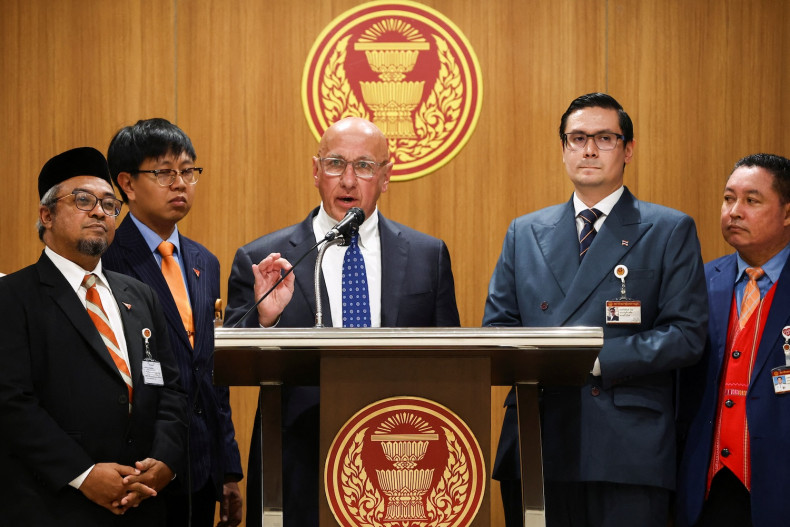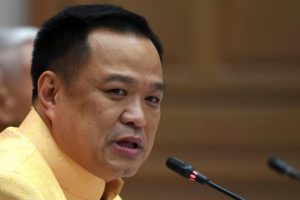Thailand will set up a task force to enhance the due diligence capabilities of its financial institutions, the country’s foreign ministry has said.
The move aims to prevent transactions by banks that could lead to arms purchases and human rights abuses in Myanmar, it said.
It follows a damning report by a United Nations Rapporteur, who said Thai banks had become the main funders of weapons for the Myanmar military, which has been accused of multiple war crimes in its three-and-a-half-year conflict against pro-democracy fighters and numerous ethnic rebel groups.
ALSO SEE: Potential Trump Win Worries Asian EV Firms – But China’s Happy
Thai banks were involved in $120 million worth of weapons and related materials exported to the neighbouring state in the 2023-24 fiscal year – “sustaining the junta’s campaign of violence and brutality against the people of Myanmar,” according to UN Rapporteur for Myanmar Tom Andrews.
Andrew’s report led to the Thai government meeting with commercial banks and state agencies to investigate the allegations.
The meeting discussed progress made in investigating transactions that may be linked to the purchase of weapons, military supplies and the Myanmar government, the foreign ministry said in a statement late on Wednesday.
The Bank of Thailand and the Anti-Money Laundering Office (AMLO) will establish a task force to investigate the transactions and review measures to “further equip and enhance the ability of Thai financial institutions,” the statement said.
Earlier this month, bank representatives told a parliamentary committee that they had followed regulations but lacked the capacity to investigate all transactions that could be used for arms purchases.
Myanmar is embroiled in a civil war that pits the military, which staged a coup in February 2021 after a decade of democracy, against a loose alliance of ethnic minority armies and multiple resistance groups loyal to a shadow government.
Last month’s report by the UN special rapporteur on human rights in Myanmar said that Thai registered companies had used local banks to transfer funds for weapons and related materials for Myanmar worth $120 million in 2023-24 fiscal year, which was double the $60 million or so transferred in the previous year.
The report said those transactions were blunting global efforts to isolate the military, which is facing its biggest ever challenge since taking back power.
Rogue employers, agents targeting Myanmar workers
Meanwhile, the war in Myanmar has displaced over two million citizens and driven a similar or greater number into Thailand, particularly since the Myanmar junta imposed a compulsory conscription law early this year.
But the conditions many of these people endure are often harsh and difficult to manage as the Thai labour system has a history of exploiting workers from adjacent countries and using unnecessary hurdles, or legal obligations, that make it hard for them to claim the minimum wage or seek work in other areas.
Many workers find it difficult to get work because they lack identity cards issued in their homeland or have cards that have expired. This has led to claims that corrupt Thai officials allow this to occur because it creates opportunities for bribes.
And the recent explosive growth of large-scale scam centres in areas of low governance on the Thai-Myanmar border has also created difficulties.
Earlier this week, there were reports of dozens of workers sent from Myanmar under a bilateral agreement being forced to open two bank accounts each in Thailand by employers who then confiscated the workers’ bank books and ATM cards – and used their accounts to launder money from illegal online gambling or other illicit sources.
In some cases tens of millions of baht have been passing through accounts that migrant workers say they have never been able to access.
Indeed, for workers being paid 10,000 baht a month such huge sums would be almost impossible to raise even if they were spectacularly successful at online gambling.
“In early June, the Myanmar Embassy in Bangkok issued a statement, warning Myanmar workers to be careful as Thai authorities had arrested a number of workers for what they said was money laundering and illegal online banking,” a report by Dawei Watch said.
That led to workers asking NGOs for help and for some in Rayong, on the eastern seaboard, to file reports with police to request that bank accounts in their names be closed, it said, although getting out of such devious schemes has not always been easy.
- Reuters with additional input (on Myanmar workers in Thailand) by Jim Pollard
ALSO SEE:
Suu Kyi Adviser Calls For Sanctions on Myanmar’s Central Bank
UN Rapporteur Calls on Thai Banks to Stop Aiding Myanmar Junta
Scamming Compounds in SE Asia Stole $64 Billion in 2023: Report
US, UK and Canada Ramp up Action Against Myanmar Junta
Myanmar’s Central Bank Cancels 120 Forex Licences – RFA
Key Bangladeshi Bank Freezes Myanmar Regime Accounts
UOB to Cut Ties With Myanmar Banks on Sept 1 – Nikkei
EU, US Sanctions Aim to Curb Funds for War in Myanmar
Crime Gangs Control Some Myanmar, Laos Economic Zones: UN
Myanmar Heading For State Collapse, ICG Warns
























